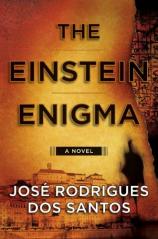The Einstein Enigma
Review
The Einstein Enigma
THE EINSTEIN ENIGMA is a fast-paced, interesting novel that begins in 1951 and brings Israeli Prime Minister David Ben-Gurion together with Albert Einstein for a discussion about the future of the new state of Israel and God. While these two giants of history, politics and science meet, the CIA is taping their conversation from a room across the street. The spy game is healthy and growing out of the Middle East with a hearty emphasis on the existence of God and what that might mean.
Fifty years later – Cairo (2010): Analyst, cryptologist and historian Thomas Noronha is standing on the steps of a building when he is approached by a stunning woman who introduces herself as Ariana Pakravan. She invites him to lunch and tells him an amazing story about a manuscript allegedly written by Albert Einstein that needs parts of it decrypted. He is intrigued both by her and the offer of $100,000 a month for two months to help decode the puzzle. He accepts the job and soon finds himself in modern-day Tehran.
Pakravan introduces him to her superiors, and they make it clear that Thomas will not be allowed anywhere near the manuscript after his first peek --- period. They refuse to allow him to read the actual text, but show him a cipher and expect him to unlock the secret of the manuscript without ever actually reading it. He has his own contacts in Iran and learns that he has already been expected to become part of a team that is going to try to steal the manuscript.
But “the best laid plans…” go awry, and Thomas is caught. He is thrown into prison and has no idea if he will ever get out, much less make it through alive. Then, in an unexpected slick move, he is released and secreted out of Iran thanks to Ariana.
José Rodrigues dos Santos takes cues from writers like Umberto Eco and Dan Brown as he interweaves an intricate plot full of surprises. From Tehran to Tibet and from New York City to Coimbra, twists and turns keep readers holding their breath. Thomas finds himself talking to people of great intelligence and spiritual power. His travels take him to parts of the world that are scattered and mysterious.
The science and mathematics that form the foundation of the novel are “all … authentic: physicists and mathematicians defend the scientific theories,” says dos Santos in his author’s note at the start of the book. He provokes the reader into thinking about universal questions that have been the basis of study and conversation for eons. He presents arguments about religion and the nature of God from a prismatic specter of ideas. But he does not presume to preach or make decisions for the reader. He simply raises the arguments and lets his audience sift through the theories of which many exist. THE EINSTEIN ENIGMA is a challenging read and will keep even the most hardcore agnostic fascinated.
Reviewed by Barbara Lipkien Gershenbaum on January 21, 2011



